
Dorsoduro is one of the six sestieri of Venice, in northern Italy.

The Palazzo Giustinian is a palace in Venice, northern Italy, situated in the Dorsoduro district and overlooking the Grand Canal next to Ca' Foscari. It is among the best examples of the late Venetian Gothic and was the final residence of Princess Louise of Artois.

The Palazzo Clary is a Late Renaissance Venetian palace facing the Giudecca Canal alongside the fondamenta Zattere by the ponte longo in Venice's Dorsoduro. It was originally built in the 17th century for a Venetian noble family. In the early 19th century, the palazzo is known as Palazzo Clary, named after it was bought by the prince Clary-Aldringen. The neighboring building is Palazzo Giustinian Recanati.
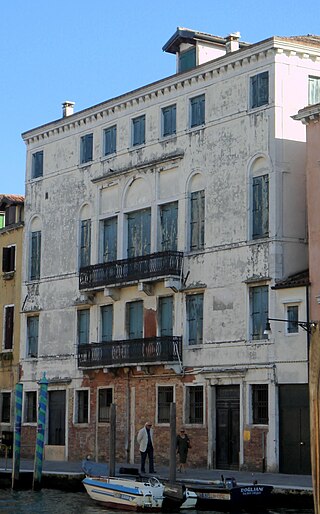
Palazzo Bonfadini Vivante is a palace in Venice, Italy located in the Cannaregio district and overlooking the Cannaregio canal. The neighboring buildings are Palazzo Savorgnan and Palazzo Testa.

Palazzo Correr Contarini Zorzi is a Renaissance palace in Venice, Italy, overlooking the Grand Canal and locating in the Cannaregio district between Palazzo Querini Papozze and Palazzo Gritti. The palazzo is also known as Ca' dei Cuori, a family whose wrought iron coats of arms is present on the façade.

Palazzo Emo Diedo is a neoclassical palace in Venice, Italy located in the Santa Croce district, overlooking the Grand Canal, opposite the railway station. The building is located near San Simeone Piccolo.

Palazzo Adoldo is a Renaissance palace in Venice, located in the Santa Croce district and overlooking the Grand Canal. On the right there is the church of San Simeon Piccolo, on the left—Palazzo Foscari Contarini.

Palazzo Civran Grimani is a Neoclassical palace in Venice, Italy. The palazzo is located in the San Polo district, overlooking the Grand Canal at the confluence with Rio della Frescada, between Palazzo Dandolo Paolucci and Palazzo Caotorta-Angaran.

Palazzetto Tiepolo or Palazzo Soranzo Pisani is a 15th century palace in Venice, located in the San Polo district and overlooking the right side of the Grand Canal, between Palazzo Tiepolo and Palazzo Tiepolo Passi. The name Palazzo Soranzo Pisani reflects the noble families Soranzo and Pisani. Thus, including the present owner the Passi Family and the Tiopolo family, the palace has been in the possession of four noble venetian families.

Palazzo Brandolin Rota is a palace in Venice, Italy, located in the Dorsoduro district and overlooking the Grand Canal, between the Gallerie dell'Accademia and Palazzo Contarini Polignac.

Palazzo Giustinian Pesaro is a Gothic palace located in Venice, Italy, in the Cannaregio district and overlooking the Grand Canal. The palazzo is situated between Ca' d'Oro and Palazzo Morosini Sagredo.

Palazzo Gritti is a palace in Venice, Italy, located in the Cannaregio district and overlooking the Grand Canal between Palazzo Memmo Martinengo Mandelli and Palazzo Correr Contarini Zorzi.

Palazzo D'Anna Viaro Martinengo Volpi di Misurata, also known as Palazzo Talenti D'Anna Volpi, is a Renaissance palace in Venice, Italy, located in the San Marco district, overlooking the left side of the Grand Canal, between Palazzo Tron and Casa Marinoni and opposite of Palazzo Donà a Sant'Aponal.
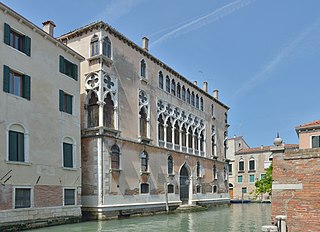
Palazzo Donà Giovannelli is a civil building located in the city of Venice, Italy in the Cannaregio district. The palace neighbors Palazzo Pasqualigo Giovannelli and overlooks the Rio di Noale and the Rio di Santa Fosca.
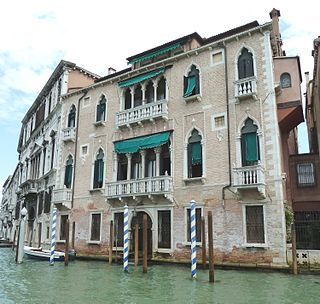
Palazzo Erizzo Nani Mocenigo is a palace in Venice located in the San Marco district and overlooking the Grand Canal between Palazzo Da Lezze and Palazzo Contarini delle Figure.

Palazzo Querini Benzon is a palace in Venice located in the San Marco district and overlooking the Grand Canal. It is placed between the small Casa De Sprit and Casa Tornielli, at the confluence of the Ca' Michiel stream. Opposite are Palazzo Bernardo and Palazzo Querini Dubois.
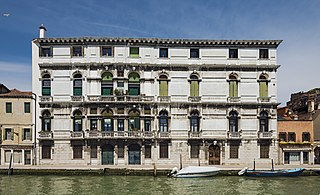
Palazzo Surian Bellotto is a Baroque palace in Venice, Italy. The palazzo is located in the Cannaregio district and overlooks the Cannaregio Canal.
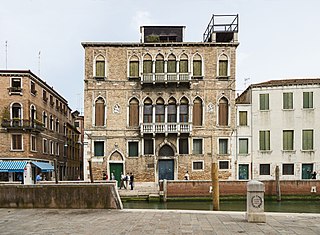
Palazzo Barbarigo Nani Mocenigo is a Gothic palace in Venice, Italy located in the Dorsoduro district, along the Nani embankment on the San Trovaso canal, near the Campo San Trovaso.
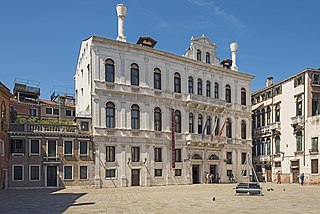
Palazzo Priuli Ruzzini Loredan, also called Palazzo Loredan at Campo Santa Maria Formosa, is a late 16th-century palace located at Campo Santa Maria Formosa in the Castello district of Venice, northern Italy, characterised by features of Renaissance and Baroque-style architecture on its façades.

Palazzo Mocenigo Gambara is a palace in Venice, located in the Dorsoduro district and overlooking the Grand Canal, between the Contarini Palazzi degli Scrigni and Corfù and Palazzo Querini alla Carità, not far from the Gallerie dell'Accademia and in front of Palazzo Giustinian Lolin.
























